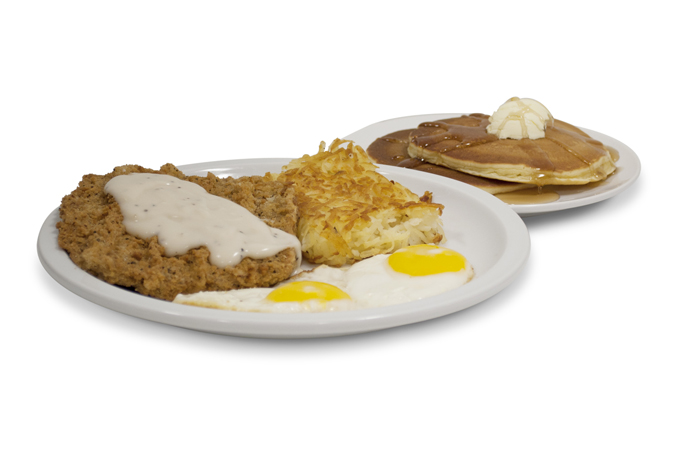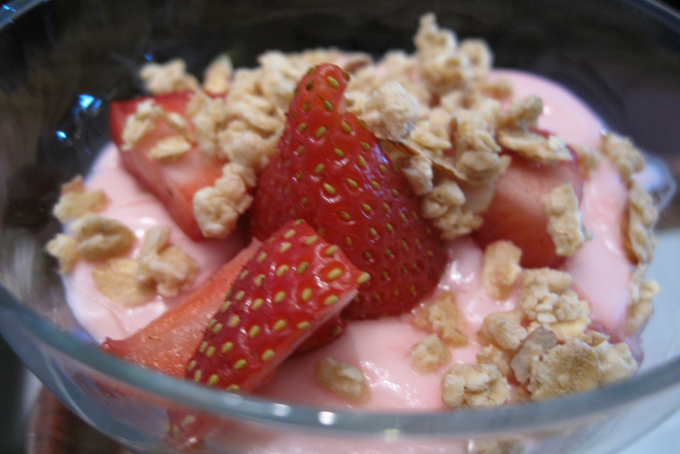
IHOP’s country fried steak and eggs comes with two eggs, hash browns and two buttermilk pancakes for a total calorie count of 1,760. It also has 3,720 milligrams of sodium. (Photo IHOP/CSPI)
(CNN) — Skipping breakfast doesn’t mean you’ll consume more calories later in the day, according to a new report from Cornell University.
Researchers split 400 college-age students into two groups; they fed one group breakfast and the other no breakfast. They then tracked their eating habits throughout the day and measured the amount of calories they were consuming.

Breakfast time in the Press cabin of Air force One during President Obama’s flight from Delhi, India to Jakarta, Indonesia. The breakfast consisted of Country Fried Steak, Scrambled eggs, Biscuits, Gravy, and Parfait. (CNN Photo/Mark Waltz)
While the non-breakfast eating group reported feeling hungry by lunchtime, they didn’t consume larger lunches compared to the group who had eaten breakfast. In fact, the breakfast skippers had consumed roughly 400 fewer calories total at the end of the day.
“The problem in our culture is that we consume too many calories, and we have to look around at ways to help us consume less,” says David Levitsky, study author and professor of nutritional sciences and of psychology at Cornell.
“And we found that if you are trying to lose weight, then skipping breakfast isn’t necessarily the worst thing for you to do.”
While the study was able to accurately measure the exact caloric intake among participants, they did not measure the energy level, metabolism or cognitive function of the breakfast eaters versus non-breakfast eaters.
Also, their sample group included only young, healthy students who were tested on only three different occasions.
And with two-thirds of America overweight or obese, the benefits suggested by Cornell researchers may not necessarily translate to the bulk of people. In fact, it’s a stark contrast to results of a Harvard study published Monday in the journal Circulation.
In this study, researchers tracked 27,000 men for 16 years.
They found participants who skipped breakfast were 27% more likely to experience a heart attack or to die as the result of coronary heart disease attack. The increased risk was seen after adjusting for age and lifestyle factors — like obesity and smoking — according to the study.
Harvard’s report suggests the impact of skipping breakfast has less to do with calorie consumption and more to do with the stress it causes on your body.
“As we sleep all night we are fasting, and so if we regularly do not ‘breakfast’ in the morning, it puts a strain on our bodies that over time can lead to insulin resistance, hypercholesterolemia and blood pressure problems, which can then lead to heart disease,” says Leah Cahill, study author and research fellow at the Harvard School of Public Health.
Cahill says the timing of breakfast first thing in the morning provides the protection against heart disease.
“Our bodies need to be fed food regularly in order to maintain healthy levels of blood lipids such as cholesterol, hormones such as insulin and normal blood pressure.”
Many previous studies have touted the benefits of eating breakfast.
“Eating breakfast fuels your brain, fuels your body, provides you instant energy,” says CNN’s chief medical correspondent Dr. Sanjay Gupta, who is also the associate chief of neurosurgery at Grady Memorial Hospital in Atlanta.
“I like to eat breakfast like a king, lunch like a prince and dinner like a peasant.”
You should eat a big meal, around 300 to 500 calories, within an hour of waking up, according to experts.
“People who have breakfast tend to perform better at work and at school, and they tend to have healthier diets overall,” says Marisa Moore, a registered dietitian with the Academy of Nutrition and Dietetics. “When you don’t eat breakfast you often end up overcompensating later in the day.”
But, of course, what you’re consuming in the morning makes a difference.
Oatmeal with skim milk, a half-ounce of nuts and a cup of mixed berries is considered the ideal breakfast because it combines whole grains, protein, heart-healthy fats and antioxidants.
“If you are a lifelong breakfast skipper it can be difficult to get started,” says Moore. “But what I say is just try to start with something that’s very quick and easy like an English muffin, with an egg or some peanut butter. A boiled egg, oatmeal. All of those can be done in less than a minute.”